
Navigation
Part A: Blue
- Albums
- Back to Page 1:
Nessworthy - Page 2: Simpson
- Page 3: The Nessworthy Genesis
- Page 4: Nosworthy Notes
- Page 5: Letters to the Editor
The Supplements

![{$text['mgr_blue1']}](../tng_placeblue.jpg) Simpson 2
Simpson 2
Of Offenbergs and Welches
by Donald McDonald Simpson
Introduction
I have made many references to the ancestors on my father's side of the family tree in my reminiscences and an account of Robert Simpson (my great grandfather) and his sons can be found at The Simpsons: The printers of South Shields. This article is devoted to the families of my maternal side which came together with the union of my grandparents, Wylam Welch and Ellen Offenberg.
From Bavaria to Shields
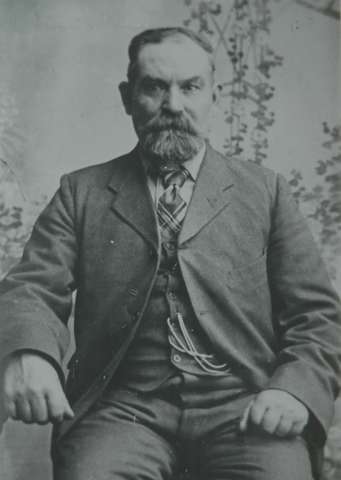
Lauritz Offenberg
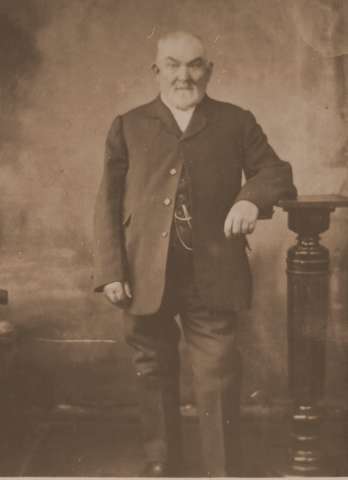
Andreas Offenberg
I do know that the Offenbergs lived in Aarhus in Denmark during the nineteenth century. Originally though, it seems that the family came from a small town called Offenberg in Bavaria. I think this would have been in the 1840s when Europe was in turmoil and the principalities were coming together to create Germany. The family may well have thought they would be better off in Denmark rather than staying to face the harsh realities under Bismarckís regime. Denmark was an eminently peaceful country although the Germans took Slesswig-Holstein from them at one time and they didnít react.
My great grandfather, Lauritz Theodore Johannesen Offenberg, was born in Denmark in 1842. I don't know much about his family apart from his father who was called Andreas. It was probably around 1864 when Laurentz sailed out of Aarhus across the ocean blue and ended up in Tynemouth. He lived in this country and may have been the first or at most the second generation of people who came across and settled here. He taught himself English by reading the Classics Ė in particular, the Waverley Novels, I think - and he also took the Anglicised name of Louis.
Kismet, Hardy?
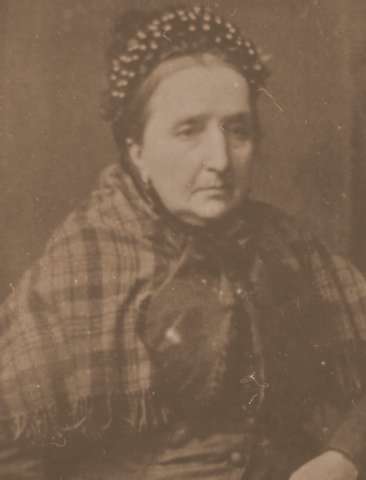
Eleanor Davis
It has taken some intriguing detective work to define the lineage of my maternal grandmother's side. One of the earliest photographs and indeed one of the enduring memories from her side of the family is that of an old lady we all referred to as Grandma Hardy. In fact my great great grandmother, Eleanor Davis was born in South Shields about 1821 and lived there throughout her adult life; dying in March 1894. She married twice, and it was by her second husband's name that we remember her.
She married John Lenney, a seaman, in the parish church of Jarrow in February 1842. For the most part they lived at Marshall's Quay, the dockside area of the town. They had two sons and five daughters - their third, Jane, my great grandmother, was born in 1849. I don't know the circumstances of his death but John died in June 1855 when Eleanor was five months pregnant with their youngest son. Eleanor married again, to John Hardy, in September 1857. The whole family, including a further son, James, were living at 28 Wellington Street, South Shields at the time of the 1861 census.
Louis Offenberg met Jane Lenney and they were married in South Shields in 1871 and had a large family of ten children. My grandmother Ellen was their oldest child and was born in 1872. He became a shipyard worker and they lived a short distance away in Mitre Street.
The Welches
John Welch married an Elizabeth Jane Thirkell in South Shields in 1847 although both of them were born in Sunderland. The census return of 1871 describes him as a tailor. They had ten children and my grandfather, Wylam, was their fifth son. This name started a family tradition although I donít know whether any of the family actually lived in Wylam, Northumberland. This family is not connected with the family that owned Welchís toffees in North Shields.
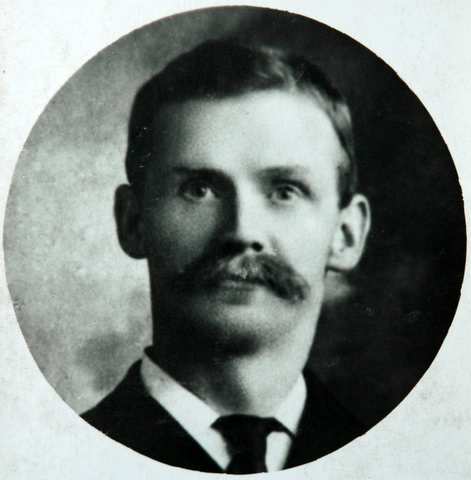
Wylam Welch

Ellen Offenberg
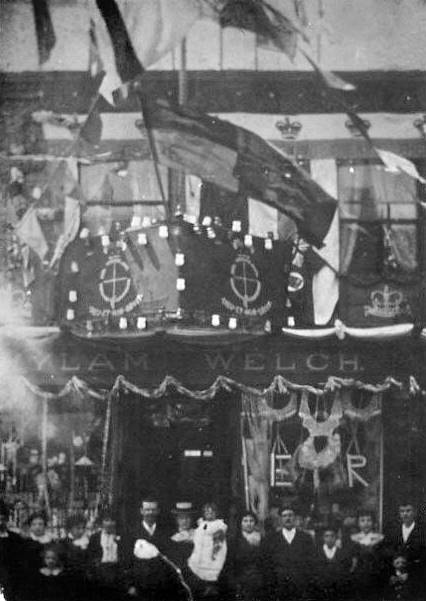
Wylam Welch's shop in Mile End Road
The scene was set for the joining of these two families and in 1891 Wylam married Ellen Offenberg in South Shields. My grandfather had several drapers shops. The main shop was in Mile End Road in South Shields where the family was living in 1901. He had a shop in North Shields (I donít know the name of the street) which his elder sister ran for a short time but she wasnít very keen on that as she didnít like the contact with the public. I think she eventually trained as a dressmaker. She was quite a clever girl at school and they had recommended that she should train as an English teacher. She was most disappointed as my grandfather had said that she was just one of several children and that if he was to support one of them, particularly a girl, then he would have to do the same for all of them and he just could not do that. So she didnít get the opportunity. I think that shop was only open for one year. I have a distant notion of them having a shop in Sunderland as well.
They had a fur shop in Chapel Row in South Shields. They used to advertise that they had genuine furs from Russia. To help that along, the coats were wrapped up in Russian newspapers which the sailors brought to him. Unfortunately there was a fire and the whole business was lost. My grandmotherís sisters were also employed in the business doing part time work. I know that my mother resented this drag on her fatherís income.
My mother, Ellen, was born in 1899 and she started working in the shops from being a girl of twelve. When she was eighteen she became a buyer and she used to go every week to the wholesale place in Newcastle to arrange deliveries. When my grandfather died she took over the shops. My mother was a very hard worker. She always said that she would have been happy running the shops for the rest of her life if it hadnít been for the fact that she had four children. She also said she would have been perfectly happy with two children but my father wanted to have a daughter and insisted on trying again. Mother said that the war was the best thing that had happened to her because she could only buy a certain amount because there was only a certain amount available.
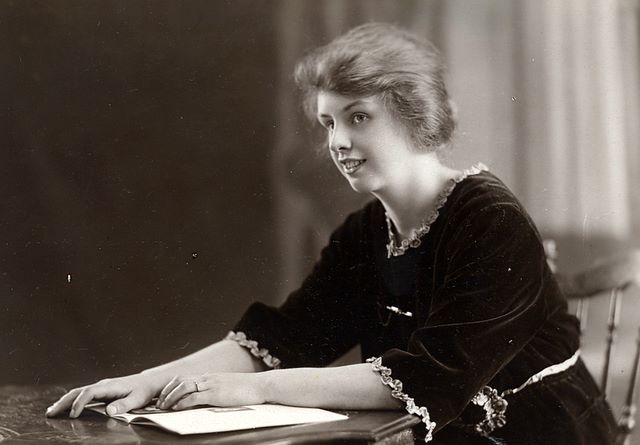
Ellen Welch, about 1920
A war hero and other uncles
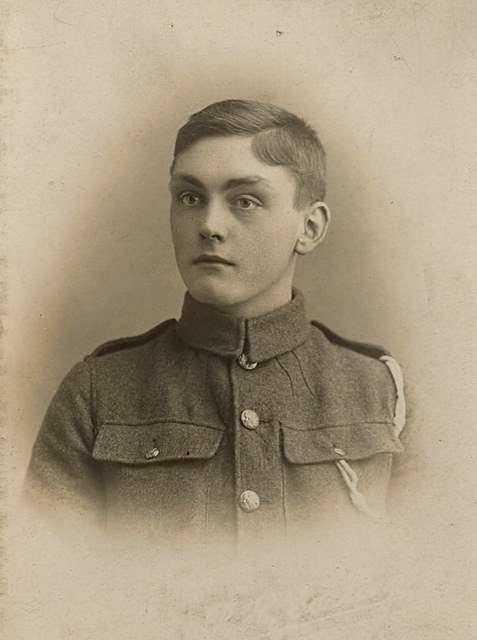
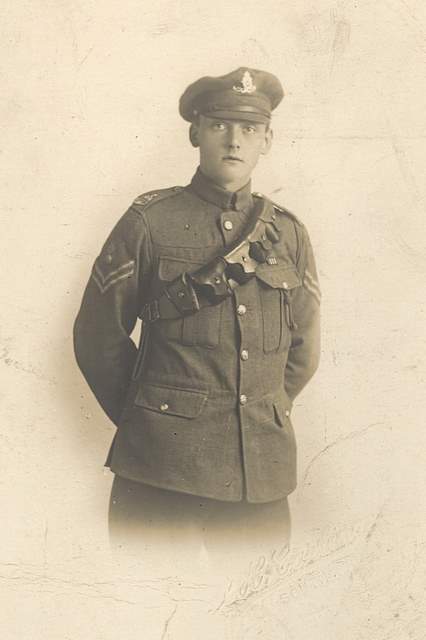
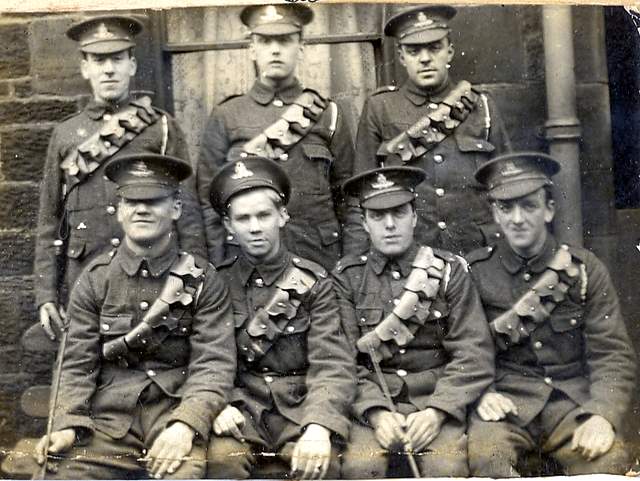
Left and centre: Wylam Welch WW1; Right: Group photograph about 1916: Wylam Welch is centre rear
I do know from our researches that my grandparents called their first born son Wylam but the child died within months in 1893. My motherís brother was also called Wylam and he was a funny little chap. We often hear of the reputation of Victorian parents and how dictatorial they were but Wylam would not take any training. So my grandfather let him just swan around the house all the time he was growing up and that went on until the first world war started. He joined up straight the way. He was in the artillery and soon got his corporal's stripes. He saw action in France. On one occasion when his company was forced to make a sudden retreat he realised that some of the guns had been left behind in a useable condition. So he ran back (I didn't hear whether he had done this on his own) and spiked some of the guns. He was captured before he could return to his own lines. He was a captive for two years until the end of the war. Grandmother always used to complain that the Germans didnít give their prisoners any food and they just starved them or gave them potato peelings. What she didnít know was that because of the complete blockade of Germany at the time their population wasnít getting any food either. He earned the Military Medal for his exploits.
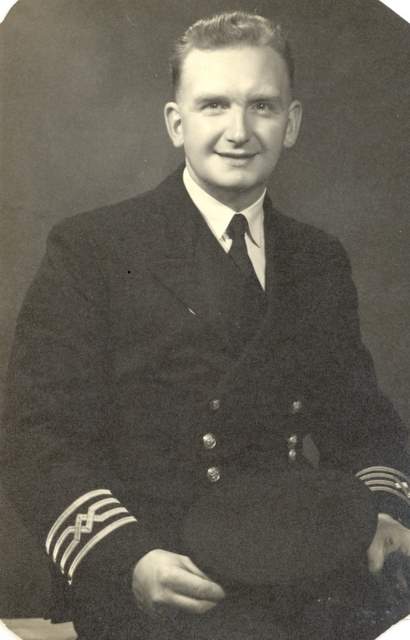
Walter Welch
Middle brother, Walter, was born in 1905 and was given the middle name Offenberg to celebrate his mother's family. He was destined to join the merchant marine and become a chief engineer. He lived in South Shieldsand and I remember that he was awarded an MBE for his services to the industry.
The youngest of the brothers was born in 1910 and was named Louis after his grandfather. Uncle Louis grew up to be a Chief Engineer on board ship and international traveller. He was a very nice fellow and very friendly. He always seemed at home wherever he went. He never trusted banks and this was brought home to me in an incident when I was a lad during the second world war. I used to go over to stay with my grandmother some evenings. She refused to move from her bed during an air raid (she didn't think the Germans were out to bomb her!) However I would have to go and shelter in the cupboard under the stairs and I had to take with me an envelope "just in case"!) As it turned out the envelope contained some £1300 which Uncle Louis had left for safe keeping.
Louis went through a tragic divorce. I guess he should never have married when he did. His wife was in her mid twenties and liked her entertainment. She was not one to lead a celibate life, not going out in the evenings but rather sitting with your old mother-in-law in front of the fire while your husband is away at sea for months on end. I know she did have an affair and she became pregnant.
Louis did marry again much later. He was in Australia and the crew were invited to a dance and to his amazement he met a girl called Louise who came from South Shields who was a nurse in tropical diseases out there. The families had known each other previously and they got on extremely well.
Memories of Grandma
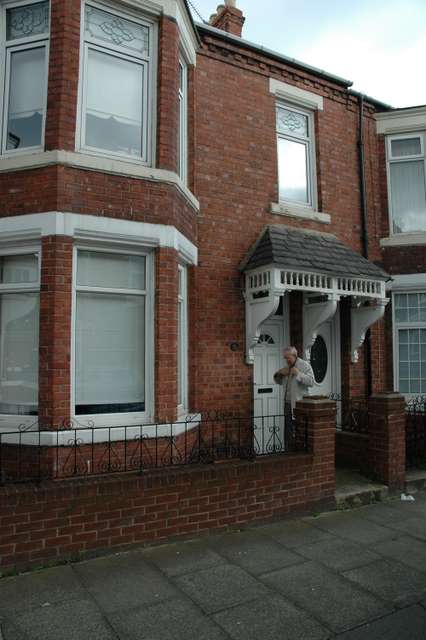
17-19 St Vincent St.
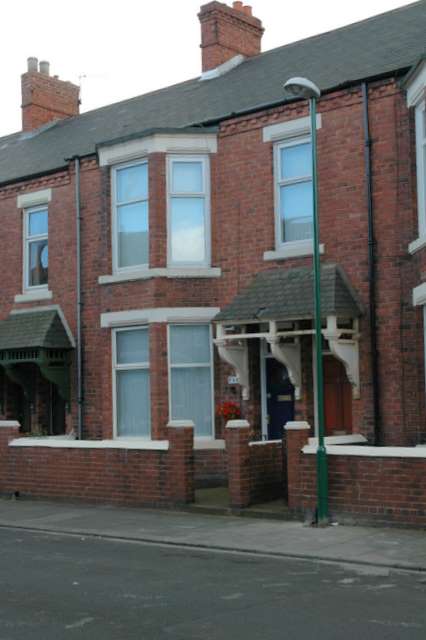
44 St Vincent St.
I personally only knew Grandmother Welch from that side of the family. She moved to a flat at No.17 St Vincent Street in South Shields when the shop closed. My mother moved to the same house when she got married and they lived in the upstairs flat and grandmother lived downstairs. My father always thought it was a bit too close. Harry and I were both born in that house and mother said she could not get the pram up and down the stairs. So they swapped and grandmother moved upstairs and then sometime later she moved to another flat at No.44. That was the same street where I lost my pocket money down a drain the day the war broke out (See Evacuee!).
I used to talk to her on a Friday night. When I was still living at St Vincent Street I would go across to see her on a Friday about half past five and tell her I was staying with her that night. Sometimes she would treat us to go to the cinema. She would give me the money to go and get some chips or something for supper and I would bring them back. We would have our supper and we would sit and talk and she would tell me a lot about her childhood. When she was a girl she used to walk from her house on the Mile End Road in South Shields up to Westoe village which was a separate little village then with very elegant houses. She remembered that she used to walk along a country lane called Farmer's Lane which is where the Town Hall is now. It used to be lined with berry bushes all along the road and she would pick blackberries.
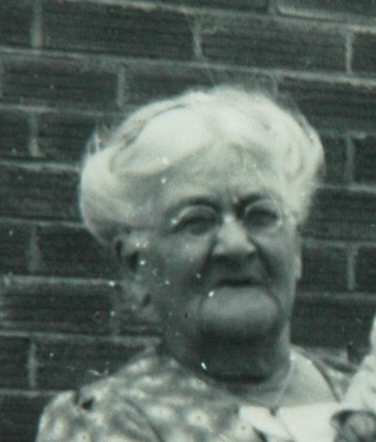
Ellen Welch in later years
The rooms in Grandmother's house was quite small and she had a lot of furniture. As she got older her eyesight became very poor. Once I found her in the back room standing on the table to do some dusting. When she saw me she asked "Donnie, have you ever seen me tap dance?" When I said that I hadn't, she proceeded to demonstrate her ability seemingly oblivious to the closeness of the edge. She also had cabinets full of old and Victorian pottery, much of it cracked and repaired. After the war ended she went to live with Uncle Louis. When she came to leave the house she asked Peter and me if we could dispose of all the pottery. She told us that nobody wanted it and nobody would even come and look at it. So one Saturday morning we took this priceless Victorian stuff and built castles out of it and hurled cricket balls at it making great showers of broken pottery. We had great fun with that.
Grandma was an outgoing sort of person. She was always ready with a small piece of advice. I remember once when Harry had erected a tent in the garden. She said: "Boys, whatever you do, never let a girl into your tent". At that age I didn't really understand why she gave us this warning (perhaps she thought they played with matches) but I think Harry did! I recall too that when you walked into her house there was often a coat was hanging on a hook in the passage. If there was a jingle when you knocked into the coat you knew that she had left pocket money in it for us.
Acknowledgements
Additional archive photographs from Chris Highmore.
Added August 15th 2007
Updated: March 21st 2012
Please contact us
 If you have any questions or comments about the information on this site in general, or you have further information regarding this article, please get in touch with us by email:
Anne or Alan. We look forward to hearing from you.
If you have any questions or comments about the information on this site in general, or you have further information regarding this article, please get in touch with us by email:
Anne or Alan. We look forward to hearing from you.Return to Top of Page
Translate this page:
Internet Beacon Diamond Site - 2010
© The Craxford Family Genealogy Magazine and individual copyright holders.Edited and maintained by Alan D. Craxford 2005 - 2025. All rights reserved. Contents may not be reproduced without permission.
You are not authorized to add this page or any images from this page to Ancestry.com (or its subsidiaries) or other fee-paying sites without our express permission and then, if given, only by including our copyright and a URL link to the web site.
















